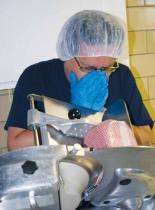What You Don’t Know About Food Workers Could Break Your Brand

Today, the Center for Research and Public Policy (CRPP) revealed the results of a study into food workers examining their values, opinions, attitudes towards work, and lifestyles. An alarming finding was revealed — more than half of employees at food companies in the United States and Canada go to work sick. The risk of food contamination from employee illness may be a big miss when it comes to food safety related preventative controls.
Why Do Food Handlers Work While Sick?
The Mind of the Food Worker study polled more than 1,200 employees on food and workplace safety at all stages of the food supply chain, including farms, processing plants, cafeterias, restaurants and grocery stores to examine their habits and attitudes towards their work.
More than 45 percent said they go to work sick because they can’t afford to lose pay. More than 46 percent said they didn’t want to let their co-workers down by not showing up for a shift. When managers were asked how many employees they thought came to work sick, the majority answered just 18 percent. This discrepancy exposes food companies to a host of legal issues, and places their brands at risk.
Sick frontline food workers can contribute to costly food recalls or deadly outbreaks. For example, according to a CDC study on foodborne norovirus outbreaks, “infected food handlers were the source of 53 percent of outbreaks and may have contributed to 82 percent of outbreaks.”
The Food Safety Culture Imperative
In response, Alchemy CEO Jeff Eastman said, “The survey findings support the need for a food safety culture that helps workers understand when it’s okay to stay home, while food companies make accommodations that keep the food supply safe.”
The same survey also showed that 85 percent of workers would serve the food they make to their family and children. “Overall the results are positive, there is always room for improvement in any industry.” Eastman says.
How Can Food Companies Respond?
A few ideas food companies may consider:
- Implementing employee wellness programs
- Offering preventative care on site
- Education and training on the impact of handling food while sick
- Improved two way communication between supervisors and employees
- Auditing and updating sick leave policies
- Training on and enforcement of proper hand hygiene
About CRPP and the study
The Mind of the Food Worker study was conducted by the Center for Research and Public Policy and commissioned by Alchemy Systems. Survey respondents worked at farms, ranches, slaughterhouses, meat facilities, food processing plants, dairies, commercial bakeries, cafeterias, restaurants, grocery deli departments and food distribution companies.
The survey was conducted of 1,203 food workers in United States and Canada during July 3-16, 2015. All surveys were conducted using an online survey instrument in English, Spanish and French. The poll has a +/- 3.0 percent margin of error at a 95 percent confidence level on a composite basis.






